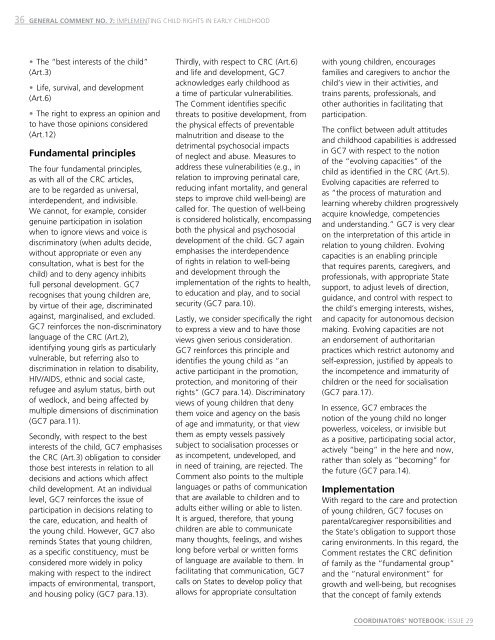A global call to action for early childhood
A global call to action for early childhood
A global call to action for early childhood
Create successful ePaper yourself
Turn your PDF publications into a flip-book with our unique Google optimized e-Paper software.
36 General comment no. 7: Implementing child rights in <strong>early</strong> <strong>childhood</strong><br />
• The “best interests of the child”<br />
(Art.3)<br />
• Life, survival, and development<br />
(Art.6)<br />
• The right <strong>to</strong> express an opinion and<br />
<strong>to</strong> have those opinions considered<br />
(Art.12)<br />
Fundamental principles<br />
The four fundamental principles,<br />
as with all of the CRC articles,<br />
are <strong>to</strong> be regarded as universal,<br />
interdependent, and indivisible.<br />
We cannot, <strong>for</strong> example, consider<br />
genuine participation in isolation<br />
when <strong>to</strong> ignore views and voice is<br />
discrimina<strong>to</strong>ry (when adults decide,<br />
without appropriate or even any<br />
consultation, what is best <strong>for</strong> the<br />
child) and <strong>to</strong> deny agency inhibits<br />
full personal development. GC7<br />
recognises that young children are,<br />
by virtue of their age, discriminated<br />
against, marginalised, and excluded.<br />
GC7 rein<strong>for</strong>ces the non-discrimina<strong>to</strong>ry<br />
language of the CRC (Art.2),<br />
identifying young girls as particularly<br />
vulnerable, but referring also <strong>to</strong><br />
discrimination in relation <strong>to</strong> disability,<br />
HIV/AIDS, ethnic and social caste,<br />
refugee and asylum status, birth out<br />
of wedlock, and being affected by<br />
multiple dimensions of discrimination<br />
(GC7 para.11).<br />
Secondly, with respect <strong>to</strong> the best<br />
interests of the child, GC7 emphasises<br />
the CRC (Art.3) obligation <strong>to</strong> consider<br />
those best interests in relation <strong>to</strong> all<br />
decisions and <strong>action</strong>s which affect<br />
child development. At an individual<br />
level, GC7 rein<strong>for</strong>ces the issue of<br />
participation in decisions relating <strong>to</strong><br />
the care, education, and health of<br />
the young child. However, GC7 also<br />
reminds States that young children,<br />
as a specific constituency, must be<br />
considered more widely in policy<br />
making with respect <strong>to</strong> the indirect<br />
impacts of environmental, transport,<br />
and housing policy (GC7 para.13).<br />
Thirdly, with respect <strong>to</strong> CRC (Art.6)<br />
and life and development, GC7<br />
acknowledges <strong>early</strong> <strong>childhood</strong> as<br />
a time of particular vulnerabilities.<br />
The Comment identifies specific<br />
threats <strong>to</strong> positive development, from<br />
the physical effects of preventable<br />
malnutrition and disease <strong>to</strong> the<br />
detrimental psychosocial impacts<br />
of neglect and abuse. Measures <strong>to</strong><br />
address these vulnerabilities (e.g., in<br />
relation <strong>to</strong> improving perinatal care,<br />
reducing infant mortality, and general<br />
steps <strong>to</strong> improve child well-being) are<br />
<strong>call</strong>ed <strong>for</strong>. The question of well-being<br />
is considered holisti<strong>call</strong>y, encompassing<br />
both the physical and psychosocial<br />
development of the child. GC7 again<br />
emphasises the interdependence<br />
of rights in relation <strong>to</strong> well-being<br />
and development through the<br />
implementation of the rights <strong>to</strong> health,<br />
<strong>to</strong> education and play, and <strong>to</strong> social<br />
security (GC7 para.10).<br />
Lastly, we consider specifi<strong>call</strong>y the right<br />
<strong>to</strong> express a view and <strong>to</strong> have those<br />
views given serious consideration.<br />
GC7 rein<strong>for</strong>ces this principle and<br />
identifies the young child as “an<br />
active participant in the promotion,<br />
protection, and moni<strong>to</strong>ring of their<br />
rights” (GC7 para.14). Discrimina<strong>to</strong>ry<br />
views of young children that deny<br />
them voice and agency on the basis<br />
of age and immaturity, or that view<br />
them as empty vessels passively<br />
subject <strong>to</strong> socialisation processes or<br />
as incompetent, undeveloped, and<br />
in need of training, are rejected. The<br />
Comment also points <strong>to</strong> the multiple<br />
languages or paths of communication<br />
that are available <strong>to</strong> children and <strong>to</strong><br />
adults either willing or able <strong>to</strong> listen.<br />
It is argued, there<strong>for</strong>e, that young<br />
children are able <strong>to</strong> communicate<br />
many thoughts, feelings, and wishes<br />
long be<strong>for</strong>e verbal or written <strong>for</strong>ms<br />
of language are available <strong>to</strong> them. In<br />
facilitating that communication, GC7<br />
<strong>call</strong>s on States <strong>to</strong> develop policy that<br />
allows <strong>for</strong> appropriate consultation<br />
with young children, encourages<br />
families and caregivers <strong>to</strong> anchor the<br />
child’s view in their activities, and<br />
trains parents, professionals, and<br />
other authorities in facilitating that<br />
participation.<br />
The conflict between adult attitudes<br />
and <strong>childhood</strong> capabilities is addressed<br />
in GC7 with respect <strong>to</strong> the notion<br />
of the “evolving capacities” of the<br />
child as identified in the CRC (Art.5).<br />
Evolving capacities are referred <strong>to</strong><br />
as “the process of maturation and<br />
learning whereby children progressively<br />
acquire knowledge, competencies<br />
and understanding.” GC7 is very clear<br />
on the interpretation of this article in<br />
relation <strong>to</strong> young children. Evolving<br />
capacities is an enabling principle<br />
that requires parents, caregivers, and<br />
professionals, with appropriate State<br />
support, <strong>to</strong> adjust levels of direction,<br />
guidance, and control with respect <strong>to</strong><br />
the child’s emerging interests, wishes,<br />
and capacity <strong>for</strong> au<strong>to</strong>nomous decision<br />
making. Evolving capacities are not<br />
an endorsement of authoritarian<br />
practices which restrict au<strong>to</strong>nomy and<br />
self-expression, justified by appeals <strong>to</strong><br />
the incompetence and immaturity of<br />
children or the need <strong>for</strong> socialisation<br />
(GC7 para.17).<br />
In essence, GC7 embraces the<br />
notion of the young child no longer<br />
powerless, voiceless, or invisible but<br />
as a positive, participating social ac<strong>to</strong>r,<br />
actively “being” in the here and now,<br />
rather than solely as “becoming” <strong>for</strong><br />
the future (GC7 para.14).<br />
Implementation<br />
With regard <strong>to</strong> the care and protection<br />
of young children, GC7 focuses on<br />
parental/caregiver responsibilities and<br />
the State’s obligation <strong>to</strong> support those<br />
caring environments. In this regard, the<br />
Comment restates the CRC definition<br />
of family as the “fundamental group”<br />
and the “natural environment” <strong>for</strong><br />
growth and well-being, but recognises<br />
that the concept of family extends<br />
COORDINATORS’ NOTEBOOK: ISSUE 29
















